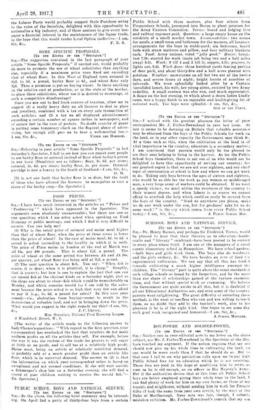FOOD PRICES.
(To THE EDITOA OF THE "SPECTATOn."1 SIR,—I have been much interested in the articles on "Prices and Profiteering ' " which have appeared in the Spectator. The arguments seem absolutely unanswerable; but there are one or Iwo questions which I am often asked when speaking on Food Economy at public meetings, and which I find it very difficult to answer. Can you help me?
(1) Why is the retail price of oatmeal and maize meal higher than that of wheat flour, when the price of these corns is lower than the price of wheat? In the case of maize meal, 44. to 61. a pound is asked (according to the locality in which it is sold). The price of Plate maize in London at the end of March was .42 Us. per 480 pounds. This is about 1:d. a. pound. The price of wheat at the same period was between 41, and £4 10s. Per quarter, yet wheat flour was being sold at 31(1. a pound.
(2) The next question is about fish. You say : " When fish is scarce, it is dear; when it is plentiful, it is cheap." Roughly, that is correct; but how is one to explain the fact that one can see unsold fish of the choicest kinds on a Saturday night, just as the shops are about to close—fish which would be unmarketable on Monday, and which remains unsold (so I am told by the seles- men) because the price asked is so high that very few can afford to pay it (e.g., Sc. Gd. a pound for soles)? In this case your remedy—viz., abstention from buying—seems to result in the destruction of valuable food, and not in bringing down the price. What would you suggest is the right remedy for this?—I ant, Sir, J. C. CHANCE,
Hon. Organizer, National Food Economy League.
3 Woodstock Street, W. I.
[The writer of the article sends us the following answer to Lady Chance's questions : "With regard to the first question, your correspondent has overlooked the fact that retailers do not make uniform profits on all the articles they sell. For example, before the war it was the custom of the trade for grocers to sell sugar at little or no profit, and to sell tea at a relatively high profit. Maize meal, being an article of relatively restricted demand, is probably sold at a much greater profit than an article like flour, which is in universal demand. The answer to (2) is that the information on which your correspondent relies is based on exceptional and net normal conditions. If she will wait outside it fishmonger's shop late on a Saturday evening, she will find a crowd of poor children waiting to receive the unsold fish."— ED. Spectator.]


































 Previous page
Previous page